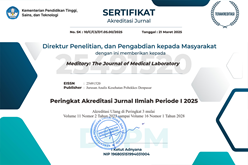THE EFFECT OF EDTA BLOOD STORAGE TIME AND ROOM TEMPERATURE ON THE EXAMINATION OF ERYTHROCYTE SEDIMENTATION RATE
DOI:
https://doi.org/10.33992/meditory.v12i2.3517Abstract
Background: Erythrocyte Sedimentation Rate (ESR) is an examination that aims to determine the speed of erythrocytes settling in the blood measured for 1 hour. The examination of ESR performed within 2 hours at most. However, the examination is often not performed immediately due to several reasons that cause delays for several hours. The room temperature during the examination affects the examination. The temperature in West Java has the highest average reaching 32°C. Aims: To determine an effect of EDTA blood storage time and room temperature on the examination of ESR. Method: This research is included in the type of quasi eksperimental research by involving variations in blood storage time immediately, 4 hours, and 5 hours and room temperature during examination is room temperature 20-25oC and temperature 29-32oC. Result: The result of this study showed that there was a significant effect of the variable EDTA blood storage time and room temperature on the examination of ESR which is indicated by the value of Sig. 0,00 (Sig. <0,05). This is because EDTA blood stored more than 2 hours after blood collection will affect the shape of the cells and the temperature can affect the settling speed. Conclusion: Based on the results of statistical tests, it can be concluded that there is an effect of EDTA blood storage time and room temperature on the examination of ESR
Downloads
Published
Issue
Section
Citation Check
License
- Articles published in Meditory are licensed under a Creative Commons Attribution-ShareAlike 4.0 International license. You are free to copy, transform, or redistribute articles for any lawful purpose in any medium, provided you give appropriate credit to the original author(s) and Meditory, link to the license, indicate if changes were made, and redistribute any derivative work under the same license.
- Copyright on articles is retained by the respective author(s), without restrictions. A non-exclusive license is granted to Meditory to publish the article and identify itself as its original publisher, along with the commercial right to include the article in a hardcopy issue for sale to libraries and individuals.
- By publishing in Meditory, authors grant any third party the right to use their article to the extent provided by the Creative Commons Attribution-ShareAlike 4.0 International license.




